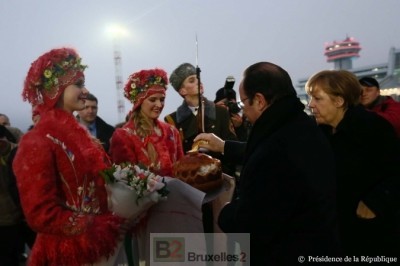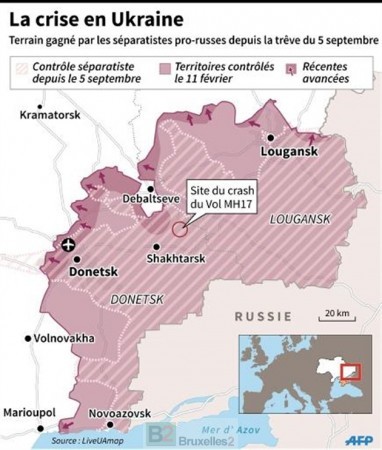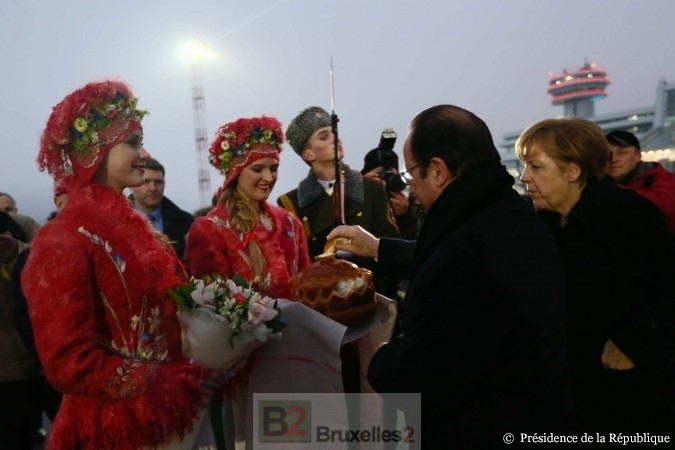The main elements of the new Minsk agreement. An armistice, not (yet) peace (shift)

(BRUSSELS2) It was finally late in the morning, after 16-17 hours of almost non-stop negotiation, that an agreement was reached between the belligerents in Ukraine. The text is signed within the contact group which brings together the separatists of Donbass (the people's republics of Donetsk and Luhansk DNR and LPR), Russians, Ukrainians and the OSCE (represented by Serbia). But it is guaranteed by the presence and a statement (To download here) of the four heads of state/government taking part in the negotiation: P. Poroshenko (Ukraine), V. Poutine (Russia), F. Hollande (France) and A. Merkel (Germany). Four personalities who, according to the French president, « lhas task - and l'obligation - to verify (than) this political process. will come to an end.
A 13-point agreement
This agreement " of a ceasefire and a comprehensive political settlement of this crisis » in the words of François Hollande, « covers all contentious issues, ranging from the truce through border control, on issues of decentralization, of course, the withdrawal of heavy weapons and the resumption of economic relations ».
The paramount provision is an agreement of cease fire which will start in 48 hours "February 15 at 0h" (item 1).
A buffer is created with a ban on the presence of belligerents and heavy weapons. Fairly wide buffer zone since it starts from the current contact line for Ukrainian troops and from the pre-existing contact line in the previous Minsk agreement (concluded on September 19, 2014) for Donbass militias. THE withdrawal of heavy weapons will have to be done according to distances varying according to the type of weapons (+/- heavy): 70 and 140 km (item 2).
Monitoring of the ceasefire and the withdrawal of heavy weapons will be ensured by theOSCE (item 3)
It comes with a amnesty granted to all participants in the events in the Donbass (point 5), from a prisoner exchange, on the principle of "all for all" (point 6), and the withdrawal of all foreign forces from Ukraine (point 10).
The supply of thehumanitarian aid will be guaranteed, in a free and secure manner, according to the principles of international law (item 7). The " socio-economic » connections are going to be restored, including the payments of social benefits by Ukraine (item 8). NB: French and Germans have promised to help " to restore part of the banking system in areas affected by the conflict, possibly through the establishment of an international mechanism to facilitate social transfers ". They also support trilateral discussions between the EU, Ukraine and Russia to find practical solutions to the concerns raised by Russia regarding the implementation of the Deep and Comprehensive Free Trade Agreement between Ukraine and the EU ».
La border management (Ukraine/Russia) will first be entrusted to OSCE observers (NB: this will require seriously strengthening this mission) before being entrusted in the long term " by Ukraine ". He will begin after the holding of local elections and will end at the end of 2015" subject to the application of the constitutional provisions (point 9).
A dialogue should be initiated, one day after the withdrawal, on the local elections (Item 4). The organization of local elections must be discussed and agreed with the representatives of the Donetsk and Luhansk regions within the framework of the contact group (point 12). The dialogue within the contact group will be intensified to resolve all other issues (item 13)
Un political process must engage, with a constitutional reform, providing for a broad "decentralization" for the inhabitants of Donbass and the adoption of a " permanent law on the special status of Donetsk and Luhansk regions by the end of 2015 (Item 11). For President Poroshenko, Ukraine remains a unitary state, there is no question of federalization anyway ».
Ukraine will always be a unitary state. No federalization whatsoever! #UnitedForUkraine pic.twitter.com/olNvhsNfNJ
- Petro Poroshenko (@poroshenko) February 12 2015
A good result
« We have now a glimmer of hope, We have agreed to a Implementation full of Minsk. More the concrete measures must of course be put in place. Andthere is still major obstacles to relieve said German Chancellor Angela Merkel cautiously during a joint press briefing with French President François Hollande held in Minsk before their departure for Brussels and the European Council. « More in the balance, I can say which ce That we have achieved is clearly more than we could hope, and that if we had obtained nothing. Therefore, we can say that this initiative was helpful. »
The Franco-German tandem at work
The German Chancellor admits, however: I have no illusions. We have no illusions. There is still much, much work needed. But there is a real chance to turn things around for the better. (...) Germany and France, France and Germany have jointly shown that we have made a contribution in line with Europe” also underlines Angela Merkel. A statement shared by François Hollande “ We have hope - although we don't have yet realized everything - but we have a hope very serious for Ukraine and therefore also for EuropeWe have one more time shown that the Franco-German tandem is capable of something for peace. »
6 to 8000 Ukrainian soldiers surrounded in debaltseve
 Russian President Putin was more fierce in his comments after the meeting. If he called « Both parts to show restraint and to avoid bloodshed », he also pointed the finger at the situation in Debaltseve (without naming this town, which remains the only significant Ukrainian "cut" inside the areas controlled by the separatists which now form a homogeneous whole - see map opposite) . There's the « a group of 6000 à 8000 military According to the separatists of Donetsk and Luhansk, the Russian president specified.
Russian President Putin was more fierce in his comments after the meeting. If he called « Both parts to show restraint and to avoid bloodshed », he also pointed the finger at the situation in Debaltseve (without naming this town, which remains the only significant Ukrainian "cut" inside the areas controlled by the separatists which now form a homogeneous whole - see map opposite) . There's the « a group of 6000 à 8000 military According to the separatists of Donetsk and Luhansk, the Russian president specified.
« They have, of course, in the idea that this group va Throw down the weapons and stop their resistance. Representatives of the Ukrainian authorities believe that their troops were not surrounded and believe that this process will continue smoothly enough. Putin expressed a few second thoughts on the peaceful outcome. " If the troops actually have summer surrounded.then, logically, they will try to break free, while those who are outside will try to set up a corridor for their military trapped » Russians and Ukrainians have ask our experts d'establish this what is really happening over there he concluded...
(Nicolas Gros-Verheyde)
(Maj) 12.2 - 14 p.m., with President Putin's reaction and details on the various points of the agreement / 13.2 4 p.m. with the full text of the declaration (in Fr)
